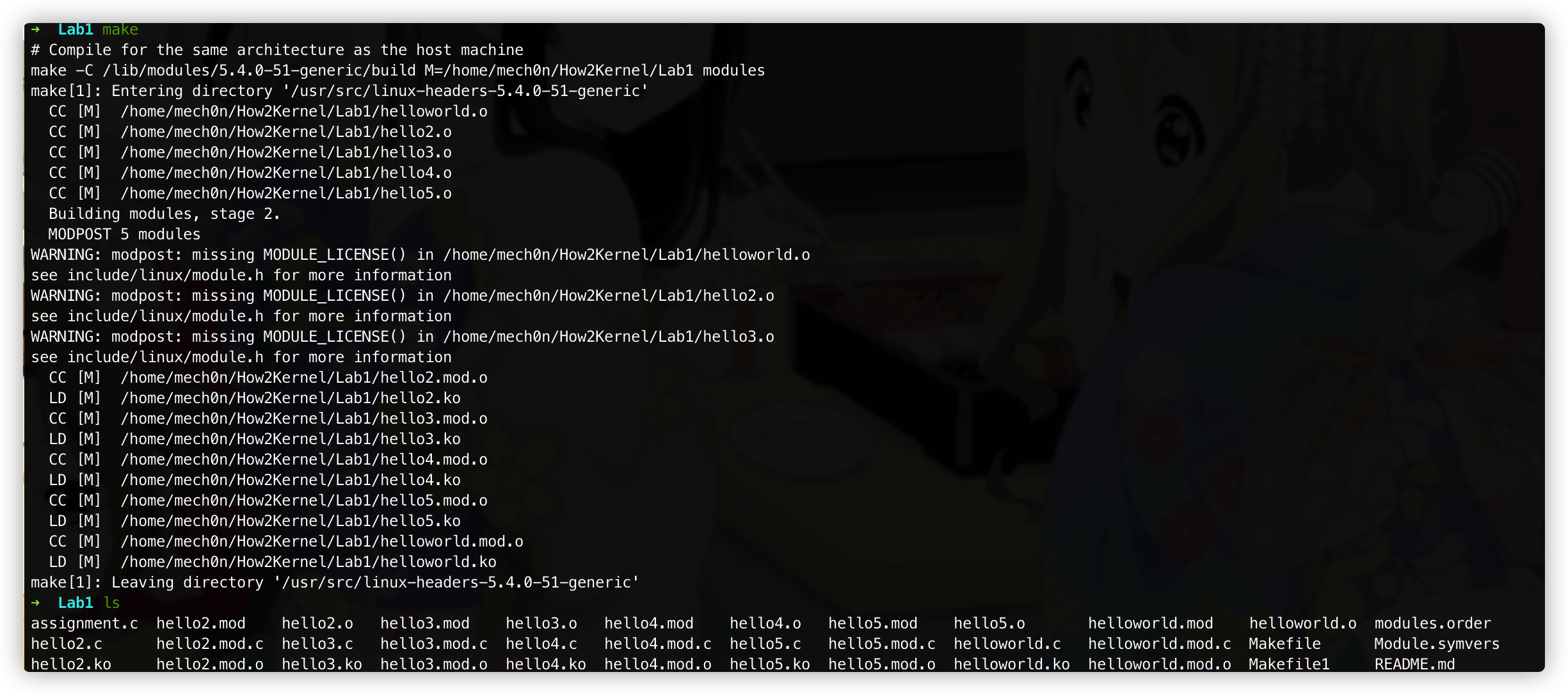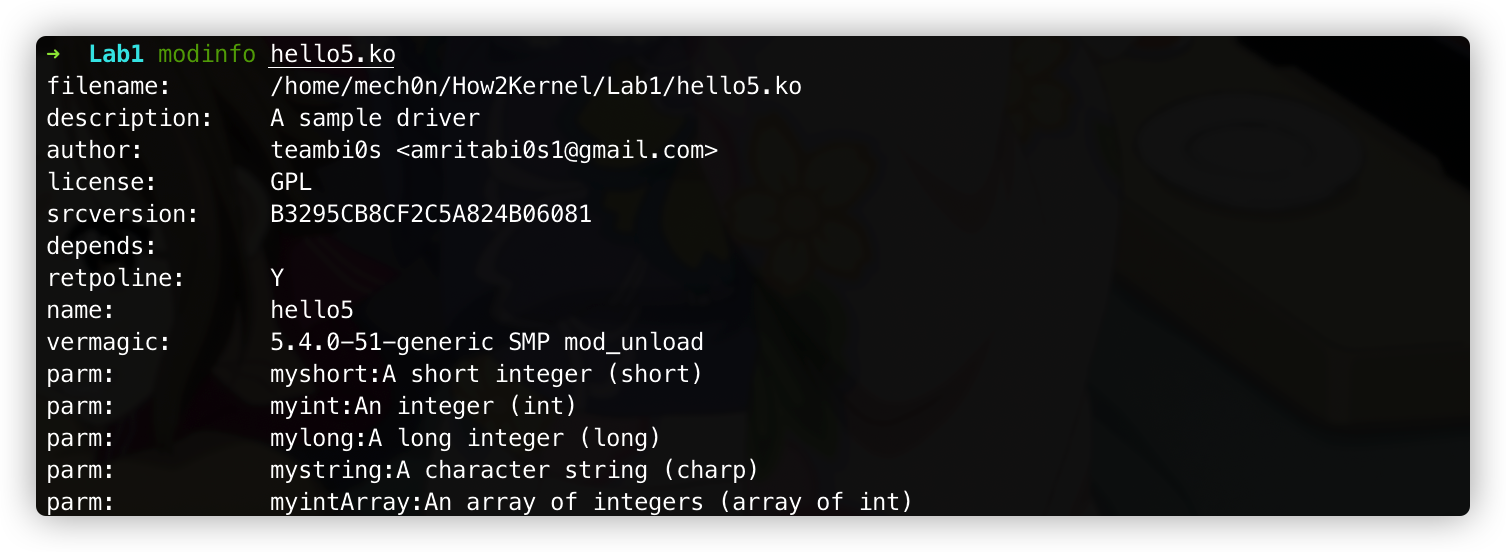How2Kernel-Lab1
How2Kernel-Lab1
总是想学pwn内核,又总是摸不着头脑,暂且找一个仓库学学看:How2Kernel
0x1 Helloworld
由于我的内核是5.4.0-51:
➜ Lab1 uname -r
5.4.0-51-generic
所以修改了一下Makefile:
ifneq ($(KERNELRELEASE),)
obj-m += helloworld.o
obj-m += hello2.o
obj-m += hello3.o
obj-m += hello4.o
obj-m += hello5.o
else
KDIR := ../kernel_source/linux-5.4.1
#KDIR := /lib/modules/$(shell uname -r)/build
PWD:=$(shell pwd)
all:
make -C $(KDIR) M=$(PWD) modules
clean:
rm -f *.ko *.mod.c *.mod *.mod.o modules.order Module.symvers *.o
endif
HelloWorld部分内核文件:
/* Module 1 - "Hello World" */
#include <linux/module.h> /* Needed by all modules */
#include <linux/kernel.h> /* Needed for KERN_ALERT */
/*
* Called when the module is inserted
*/
int init_module(void)
{
printk(KERN_INFO "Hello world 1.\n");
/*
* return value :
* 0 means successful
* non 0 means init_module failed and module can't be loaded.
*/
return 0;
}
/*
* Called when the module is removed from the kernel
*/
void cleanup_module(void)
{
/* Cleanup module should always be of type void */
printk(KERN_INFO "Goodbye world 1.\n");
}
编译模块:

然后加载模块:
➜ Lab1 sudo insmod helloworld.ko
➜ Lab1 sudo rmmod helloworld.ko
➜ Lab1 dmesg | tail

0x2 Hello2.c
init_module是默认的模块的入口,如果指定其他的函数作为模块的入口就需要module_init函数。
init_module()是真正的入口,module_init是宏,如果在模块中使用module_init(),最后还是调用的到init_module(),具体可以参考源码。
同理,module_exit()也是如此。
/* Each module must use one module_init(). */
#define module_init(initfn) \
static inline initcall_t __maybe_unused __inittest(void) \
{ return initfn; } \
int init_module(void) __copy(initfn) __attribute__((alias(#initfn)));
/* This is only required if you want to be unloadable. */
#define module_exit(exitfn) \
static inline exitcall_t __maybe_unused __exittest(void) \
{ return exitfn; } \
void cleanup_module(void) __copy(exitfn) __attribute__((alias(#exitfn)));
所以模块还可以写成这样:
/*
* Demonstrating the module_init() and module_exit() macros.
* This is preferred over using init_module() and cleanup_module().
*/
#include <linux/module.h> /* Needed by all modules */
#include <linux/kernel.h> /* Needed for KERN_ALERT */
#include <linux/init.h> /* Needed for the macros */
static int __init hello_2_init(void)
{
printk(KERN_INFO "Hello, world 2\n");
return 0;
}
static void __exit hello_2_exit(void)
{
printk(KERN_INFO "Goodbye, world 2\n");
}
module_init(hello_2_init);
module_exit(hello_2_exit);
加载模块:

0x3 Hello3.c
We now try to define a global variable and print its value during the insmod to the kernel logs.
You are introduced to the __initdata macro.
补充知识:内核中的宏定义__init,__initdata,__exitdata
源码:
/* These are for everybody (although not all archs will actually
discard it in modules) */
#define __init __section(.init.text) __cold __latent_entropy __noinitretpoline
#define __initdata __section(.init.data)
#define __initconst __section(.init.rodata)
#define __exitdata __section(.exit.data)
#define __exit_call __used __section(.exitcall.exit)
所以在新的程序里,我们把hello3_data初始化到.data段。
/*
* Illustrating the __init, __initdata and __exit macros.
*/
#include <linux/module.h> /* Needed by all modules */
#include <linux/kernel.h> /* Needed for KERN_ALERT */
#include <linux/init.h> /* Needed for the macros */
/*
* Data gets initalized during the insertion process itself.
*/
static int hello3_data __initdata = 3;
static int __init hello_3_init(void)
{
printk(KERN_INFO "Hello, world %d\n", hello3_data);
return 0;
}
static void __exit hello_3_exit(void)
{
printk(KERN_INFO "Goodbye, world 3\n");
}
/*
* Macros defined in the kernel itself for
* calling functions during insertion and deletion
*/
module_init(hello_3_init);
module_exit(hello_3_exit);
加载模块:

0x4 Hello4.c
Learn to License your driver with the GPL license and add information about your driver.
补充知识:[Linux Kernel] 簡單 hello world: License and Module 介紹(part 3)
/* Generic info of form tag = "info" */
#define MODULE_INFO(tag, info) __MODULE_INFO(tag, tag, info)
/* For userspace: you can also call me... */
#define MODULE_ALIAS(_alias) MODULE_INFO(alias, _alias)
/* Soft module dependencies. See man modprobe.d for details.
* Example: MODULE_SOFTDEP("pre: module-foo module-bar post: module-baz")
*/
#define MODULE_SOFTDEP(_softdep) MODULE_INFO(softdep, _softdep)
/*
* MODULE_FILE is used for generating modules.builtin
* So, make it no-op when this is being built as a module
*/
#ifdef MODULE
#define MODULE_FILE
#else
#define MODULE_FILE MODULE_INFO(file, KBUILD_MODFILE);
#endif
/*
* The following license idents are currently accepted as indicating free
* software modules
*
* "GPL" [GNU Public License v2]
* "GPL v2" [GNU Public License v2]
* "GPL and additional rights" [GNU Public License v2 rights and more]
* "Dual BSD/GPL" [GNU Public License v2
* or BSD license choice]
* "Dual MIT/GPL" [GNU Public License v2
* or MIT license choice]
* "Dual MPL/GPL" [GNU Public License v2
* or Mozilla license choice]
*
* The following other idents are available
*
* "Proprietary" [Non free products]
*
* Both "GPL v2" and "GPL" (the latter also in dual licensed strings) are
* merely stating that the module is licensed under the GPL v2, but are not
* telling whether "GPL v2 only" or "GPL v2 or later". The reason why there
* are two variants is a historic and failed attempt to convey more
* information in the MODULE_LICENSE string. For module loading the
* "only/or later" distinction is completely irrelevant and does neither
* replace the proper license identifiers in the corresponding source file
* nor amends them in any way. The sole purpose is to make the
* 'Proprietary' flagging work and to refuse to bind symbols which are
* exported with EXPORT_SYMBOL_GPL when a non free module is loaded.
*
* In the same way "BSD" is not a clear license information. It merely
* states, that the module is licensed under one of the compatible BSD
* license variants. The detailed and correct license information is again
* to be found in the corresponding source files.
*
* There are dual licensed components, but when running with Linux it is the
* GPL that is relevant so this is a non issue. Similarly LGPL linked with GPL
* is a GPL combined work.
*
* This exists for several reasons
* 1. So modinfo can show license info for users wanting to vet their setup
* is free
* 2. So the community can ignore bug reports including proprietary modules
* 3. So vendors can do likewise based on their own policies
*/
#define MODULE_LICENSE(_license) MODULE_FILE MODULE_INFO(license, _license)
/*
* Author(s), use "Name <email>" or just "Name", for multiple
* authors use multiple MODULE_AUTHOR() statements/lines.
*/
#define MODULE_AUTHOR(_author) MODULE_INFO(author, _author)
/* What your module does. */
#define MODULE_DESCRIPTION(_description) MODULE_INFO(description, _description)
啊这。😅
/* Not Yet Implemented */
#define MODULE_SUPPORTED_DEVICE(name)
走走程序:
/*
* Demonstrates module documentation.
*/
#include <linux/module.h>
#include <linux/kernel.h>
#include <linux/init.h>
#define DRIVER_AUTHOR "teambi0s <amritabi0s1@gmail.com>"
#define DRIVER_DESC "A sample driver"
static int __init init_hello_4(void)
{
printk(KERN_INFO "Hello, world 4\n");
return 0;
}
static void __exit cleanup_hello_4(void)
{
printk(KERN_INFO "Goodbye, world 4\n");
}
module_init(init_hello_4);
module_exit(cleanup_hello_4);
/*
* To remove the "tainted module" message we licence
* the code as GPL.
*/
MODULE_LICENSE("GPL");
MODULE_AUTHOR(DRIVER_AUTHOR); /* Who wrote this module? */
MODULE_DESCRIPTION(DRIVER_DESC); /* What does this module do */
/*
* This module uses /dev/testdevice. The MODULE_SUPPORTED_DEVICE macro might
* be used in the future to help automatic configuration of modules, but is
* currently unused other than for documentation purposes.
*/
MODULE_SUPPORTED_DEVICE("testdevice");
加载模块:

查看信息:

0x5 Hello5.c
Learn to pass arguments to the kernel module while inserting it. And then use it
补充知识:送參數到 module 中
當然可以在載入 module 的同時帶參數進去,只不過不是用傳統的 argc/argv 的方式。在 Linux kernel 中,必須藉助 module_param() 巨集 (定義在 linux/moduleparam.h 中) 來達成。
--- 送參數到 module 中
贴代码:
/*
* hello-5.c - Demonstrates command line argument passing to a module.
*/
#include <linux/module.h>
#include <linux/moduleparam.h>
#include <linux/kernel.h>
#include <linux/init.h>
#include <linux/stat.h>
MODULE_LICENSE("GPL");
MODULE_AUTHOR("teambi0s <amritabi0s1@gmail.com>");
MODULE_DESCRIPTION("A sample driver");
static short int myshort = 1;
static int myint = 420;
static long int mylong = 9999;
static char *mystring = "blah";
static int myintArray[2] = { -1, -1 };
static int arr_argc = 0;
/*
* module_param(foo, int, 0000)
* The first param is the parameters name
* The second param is it's data type
* The final argument is the permissions bits,
* for exposing parameters in sysfs (if non-zero) at a later stage.
*/
module_param(myshort, short, S_IRUSR | S_IWUSR | S_IRGRP | S_IWGRP);
MODULE_PARM_DESC(myshort, "A short integer");
module_param(myint, int, S_IRUSR | S_IWUSR | S_IRGRP | S_IROTH);
MODULE_PARM_DESC(myint, "An integer");
module_param(mylong, long, S_IRUSR);
MODULE_PARM_DESC(mylong, "A long integer");
module_param(mystring, charp, 0000);
MODULE_PARM_DESC(mystring, "A character string");
/*
* module_param_array(name, type, num, perm);
* The first param is the parameter's (in this case the array's) name
* The second param is the data type of the elements of the array
* The third argument is a pointer to the variable that will store the number
* of elements of the array initialized by the user at module loading time
* The fourth argument is the permission bits
*/
module_param_array(myintArray, int, &arr_argc, 0000);
MODULE_PARM_DESC(myintArray, "An array of integers");
static int __init hello_5_init(void)
{
int i;
printk(KERN_INFO "Hello, world 5\n=============\n");
printk(KERN_INFO "myshort is a short integer: %hd\n", myshort);
printk(KERN_INFO "myint is an integer: %d\n", myint);
printk(KERN_INFO "mylong is a long integer: %ld\n", mylong);
printk(KERN_INFO "mystring is a string: %s\n", mystring);
for (i = 0; i < (sizeof myintArray / sizeof (int)); i++)
{
printk(KERN_INFO "myintArray[%d] = %d\n", i, myintArray[i]);
}
printk(KERN_INFO "got %d arguments for myintArray.\n", arr_argc);
return 0;
}
static void __exit hello_5_exit(void)
{
printk(KERN_INFO "Goodbye, world 5\n");
}
module_init(hello_5_init);
module_exit(hello_5_exit);
加载模块:

参数信息:通过 modinfo 可以看到这个 module 的参数。

0x6 assignment.c
- Take a string as a argument during
insmod- Have a integer variable 'key' defined as 13.
- Print the string taken from the user and the key in the init_module()
- Perform Ceaser Cipher on the string and print the result during cleanup_module()
- Add the name of the file in the Makefile
- Compile and test it.
实现代码:
/*
*
*
*/
#include <linux/module.h> /* Needed by all modules */
#include <linux/kernel.h> /* Needed for KERN_ALERT */
#include <linux/init.h> /* Needed for the macros */
#include <linux/string.h>
// Take a string as a argument during insmod
static char *mystring = "blah";
module_param(mystring, charp, 0000);
MODULE_PARM_DESC(mystring, "A character string");
// Have a integer variable 'key' defined as 13.
static int key = 13;
module_param(key, int, S_IRUSR | S_IWUSR | S_IRGRP | S_IROTH);
MODULE_PARM_DESC(key, "An integer");
static int __init assignment_init(void)
{
// Print the string taken from the user and the key in the init_module()
printk(KERN_INFO "mystring is a string: %s\n", mystring);
printk(KERN_INFO "key is an integer: %d\n", key);
return 0;
}
static void __exit assignment_exit(void)
{
/* Your Code here */
// Perform Ceaser Cipher on the string and print the result during cleanup_module()
int i;
char result[100] = {0};
char small_letter[26]={'a','b','c','d','e','f','g','h','i','j','k','l','m','n','o','p','q','r','s','t','u','v','w','x','y','z'};
char big_letter[26]={'A','B','C','D','E','F','G','H','I','J','K','L','M','N','O','P','Q','R','S','T','U','V','W','X','Y','Z'};
int m = strlen(mystring);
for(i=0;i<m;i++) {
if (mystring[i] >= 'A' && mystring[i] <= 'Z') {
result[i] = big_letter[((mystring[i] - 'A') + 10) % 26];
} else if (mystring[i] >= 'a' && mystring[i] <= 'z') {
result[i] = small_letter[((mystring[i] - 'a') + 10) % 26];
} else result[i] = mystring[i];
}
printk(KERN_INFO "Ceaser Cipher: %s\n", result);
}
module_init(assignment_init);
module_exit(assignment_exit);
编译加载:
ifneq (${KERNELRELEASE},)
obj-m += helloworld.o
obj-m += hello2.o
obj-m += hello3.o
obj-m += hello4.o
obj-m += hello5.o
obj-m += assignment.o
# Assignment module here
else
KERNEL_SOURCE := /lib/modules/$(shell uname -r)/build
#../kernel_source/linux-4.18.16/ # ../kernel_source/linux-5.4.1/
PWD=$(shell pwd)
default:
# Compile for the same architecture as the host machine
make -C $(KERNEL_SOURCE) M=${PWD} modules
arm:
# Cross compile for arm64/aarch64 architecture - Cross compiler needed !!!
ARCH=arm64 CROSS_COMPILE=aarch64-linux-gnu- $(MAKE) -C $(KERNEL_SOURCE) M=${PWD} modules
clean:
# Cleans the Directory - removes all the files that were created
$(MAKE) -C /lib/modules/$(shell uname -r)/build M=$(PWD) clean
#rm -f *.ko *.mod.c *.mod *.mod.o modules.order Module.symvers *.o
endif



 浙公网安备 33010602011771号
浙公网安备 33010602011771号